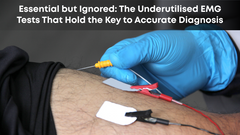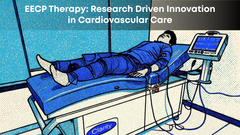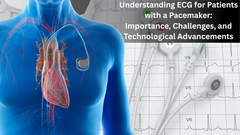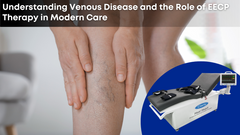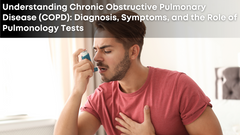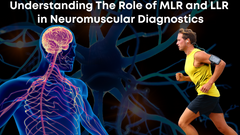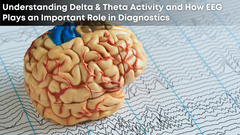A quick guide to understanding Acute Coronary Syndrome
Acute coronary syndrome (ACS) is a medical emergency that occurs when the blood flow to the heart is suddenly reduced or blocked. Typically caused by plaque build-up in the arteries that supply the heart muscle with oxygen and nutrients, undiagnosed or untreated ACS can rupture or cause a blood clot, leading to a sudden and severe reduction in blood flow to the heart.
ACS can manifest in different ways, depending on the severity and duration of the blockage. The three types of ACS are unstable angina, non-ST elevation myocardial infarction (NSTEMI), and ST-elevation myocardial infarction (STEMI).
- > Unstable angina is chest pain or discomfort that occurs at rest or with minimal exertion and is a warning sign that a heart attack may occur soon.
- > NSTEMI occurs when there is a partial blockage in one of the coronary arteries, causing damage to the heart muscle. Symptoms may include chest pain, shortness of breath, and fatigue.
- > STEMI is a more severe form of ACS and occurs when a coronary artery is completely blocked, causing a large portion of the heart muscle to die. Symptoms may include severe chest pain, shortness of breath, nausea, and sweating.
What causes ACS?
The most common cause of ACS is atherosclerosis, which is the buildup of fatty deposits (plaque) in the arteries that supply the heart. Other causes of ACS may include:
- > Blood clots: Blood clots can form on the plaque's surface, completely blocking the artery and causing a heart attack.
- > Spasm of the coronary arteries: The coronary arteries can spasm, causing a sudden reduction in blood flow to the heart.
- > Dissection of the coronary artery: A tear in the inner layer of the coronary artery can cause a flap that blocks blood flow to the heart.
- > Drug use: Using cocaine, amphetamines, or other stimulants can cause a sudden constriction of the coronary arteries, leading to ACS.
- > Inflammation: Inflammation in the coronary artery walls can cause plaque to rupture, forming blood clots that can block the artery.
- > Radiation therapy: Radiation therapy for breast cancer, lung cancer, or lymphoma can damage the coronary arteries, increasing the risk of ACS.
- > Genetic factors: Genetic factors can play a role in the development of ACS. Some people may have inherited conditions that increase their risk of developing atherosclerosis or other cardiovascular diseases.
What are the symptoms of ACS?
The symptoms of ACS can vary depending on the severity of the blockage and the individual, but the most common symptoms include:
- > Chest pain or discomfort: This is the most common symptom of ACS. The pain or discomfort may feel like chest tightness, pressure, squeezing, or burning sensation. It may also spread to the shoulders, arms, neck, jaw, or back.
- > Shortness of breath: You may experience difficulty breathing or feel like you can't catch your breath. This may occur with or without chest pain.
- > Nausea or vomiting: You may feel sick to your stomach or vomit. These symptoms may occur with or without chest pain.
- > Sweating: You may break out in a cold sweat, or your skin may feel clammy or cold to the touch.
- > Dizziness or lightheadedness: You may feel faint, dizzy, or lightheaded. These symptoms may occur with or without chest pain.
It is important to note that not everyone experiences all of these symptoms. Some people may only experience mild symptoms or no symptoms at all. In addition, some people may experience atypical symptoms, such as fatigue, indigestion, or upper back pain.
Is our lifestyle accelerating ACS?
Unhealthy eating habits that are high in saturated and trans fats, cholesterol, and sodium can lead to the development of atherosclerosis, the buildup of plaque in the arteries. Additionally, a lack of exercise or a sedentary lifestyle can contribute to obesity, high blood pressure, and high cholesterol, all risk factors for ACS.
Smoking is a significant risk factor for ACS, as it damages the lining of the arteries and increases the risk of blood clots. Excessive alcohol consumption can also increase the risk of high blood pressure, arrhythmias, and heart failure, all of which can contribute to the development of ACS.
However, it is essential to note that while lifestyle factors can contribute to the development of ACS, they are not the only factors. Other factors such as age, family history, and medical conditions can also increase the risk of developing ACS. It is important to talk to a healthcare professional about your individual risk factors and ways to reduce your risk of developing ACS.
How is ACS diagnosed?
Medical professionals use various techniques to diagnose critical illnesses such as ACS. Blood tests, including Cardiac troponin T and echocardiograms, remain the main diagnostic tools at their disposal. ECG machines from reputed manufacturers such as Clarity Medical can help your diagnostic teams triage patients better and faster than ever before. Featuring splash-resistant keyboards, direct function keys, and a highly accurate proprietary TISA interpretation technology, Clarity's ECG devices can gather up to 12-lead data including I, II, III, aVR, aVL, aVF, and V1 - V6 pre cordials simultaneously, making them one of the top devices in the market. Clarity's ST analysis interprets ECG morphology for a broad patient population and helps medical professionals make informed triage decisions.
Can I prevent ACS?
Absolutely. Preventing ACS (Acute Coronary Syndrome) involves making healthy lifestyle choices and managing any medical conditions that increase your risk. Here are some steps you can take to help prevent ACS:
- > Quit smoking: If you smoke, quitting smoking is one of the most critical steps to prevent ACS. Smoking is a significant risk factor for heart disease and ACS, and quitting can help reduce your risk.
- > Eat a healthy diet: Eating a diet low in saturated and trans fats, cholesterol, and sodium and high in fruits, vegetables, whole grains, and lean protein can help reduce your risk of developing ACS. Choose foods that are high in fibre, vitamins, and minerals.
- > Get regular exercise: Regular exercise can help reduce your risk of developing ACS. Aim for at least 150 minutes of moderate or 75 minutes of vigorous-intensity exercise per week.
- > Manage your weight: Maintaining a healthy weight can help reduce your risk of developing ACS. Aim for a body mass index (BMI) within the healthy range (18.5 to 24.9).
- > Manage stress: Chronic stress can contribute to the development of ACS. Finding healthy stress management methods like exercise, relaxation techniques, or counselling can help reduce your risk.
- > Manage any medical conditions: Medical conditions such as high blood pressure, high cholesterol, and diabetes can increase your risk of developing ACS. Managing these conditions through lifestyle changes and medication can help reduce your risk.
- > Limit alcohol intake: Excessive alcohol consumption can increase your risk of developing ACS. Limiting alcohol intake to no more than one drink per day for women and two for men can help reduce your risk.
It's important to talk to your healthcare provider about your individual risk factors for ACS and work with them to develop a plan to reduce your risk.
Conclusion
Cardiac illnesses such as Acute coronary syndrome can quickly become life-threatening unless diagnosed in time by a healthcare provider. Clarity Medical's world-class ECG machines help you ensure the health of your patients and make informed cardiac care decisions. Ready to meet the rigors of intensive cardiac care units, our devices can gather 12-lead data simultaneously, leading to quality diagnostics, reportage and class-leading reliability.






